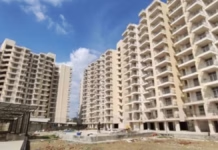JSW Commits Over Rs 50,000 Crore to Green Steel Facility in Salav
Recent Comments
Delhi NCR Property Growth Trails Tier Two Cities
Delhi’s residential real estate market, long regarded as one of India’s most dependable investment destinations, is facing a period of subdued performance as emerging...
NCR Urban Zoning Expands Local Medical Access
Urban planning across the National Capital Region is poised for a structural shift as Haryana clears a new policy allowing nursing homes to operate...
Gurgaon Construction Boom Outpaces Pollution Controls
Gurgaon’s rapid construction-led expansion is colliding with weak on-ground compliance to air pollution safeguards, with official data indicating that a large majority of major...
Delhi Property Tax Scheme Deadline Extended Again
Delhi’s municipal administration has extended the deadline for its ongoing property tax settlement programme, offering property owners additional time to regularise long-pending dues under...
Adani Group Select Puneet Awasthie as Operations Head
Adani Group has appointed a senior executive to lead its business development and operational strategy, signalling an intensification of its infrastructure and real estate...







